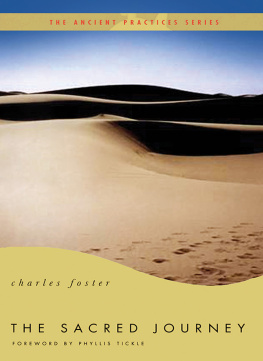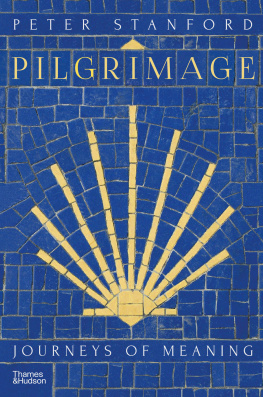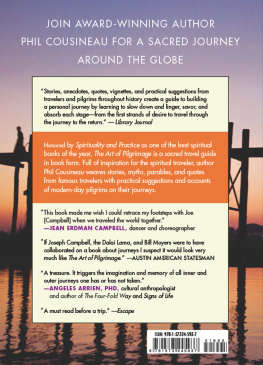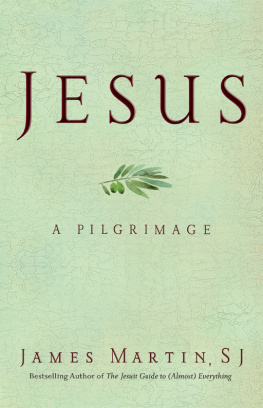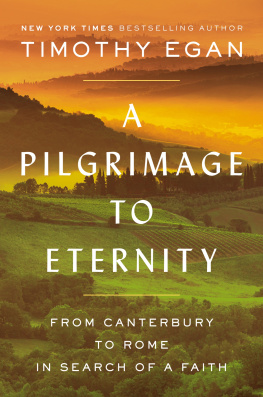1
Praise for 3000 Miles to Jesus
Lisa Deam reminds us through the surprisingly modern words of medieval pilgrims that true pilgrimage is mapped first in the heart, and launches us on a journey that deconstructs our comfort, safety, and autonomy. Deams accessible writing and deep knowledge of those whove journeyed before us make 3000 Miles to Jesus a welcome companion for all spiritual seekers who find themselves drawn to pilgrimages narrow, beautiful road.
Chuck DeGroat, Professor of Pastoral Care
and Christian Spirituality,
Western Theological Seminary
In 3000 Miles to Jesus you will walk to Jerusalem accompanied by medieval pilgrims. You will also discover an instructive metaphor for spiritual formation in our modern dayspilgrimage. Much like the Holy City itself, the journey invites the reader to consider incarnation and transcendence. If you hunger for a historical yet fresh perspective on spiritual formation with invigorating language to reframe our walk with God, this book will come as a gift.
Kelley Nikondeha, author of Defiant: What the Women of Exodus Teach Us about Freedom
I cant decide if what I love the most about 3000 Miles to Jesus is Lisa Deams evocative description of the life and times of medieval pilgrims, or the way she skillfully relates their adventures to spirituality here in the twenty-first century. Either way, this book is a delight and an inspiration.
Carl McColman, author of The Big Book of Christian Mysticism and Eternal Heart
In this wise and gentle book, medievalist Lisa Deam ably guides us into the wonders and realities of pilgrimage. Furnishing our scrip with stories of historic pilgrims and insights of spiritual mentors, Deam introduces us to lesser-known brother- and sister-wanderers who encourage us on our own journeys. With beautifully illuminated writing, Deam invites us reader-wanderers to begin again, today, in the pilgrimage of faith.
Laura M. Fabrycky, author of
Keys to Bonhoeffers Haus
With ancient pilgrims as our guides, Lisa Deams lovely book will be a wonderful spiritual companion to all who undertake the journey. Deam doesnt call us away from the physical path of pilgrimage but rather helps us see that just as Margery Kempe practiced faith by walking, the inward journey of faith is also a form of travel. This journey might call us to travel with our feet or take us no greater distance than our own spiritual landscape. When I put this book down, I was ready to start planning my trip.
Christiana N. Peterson, author of Mystics and Misfits and Awakened by Death
Lisa Deam expertly guides us back to a time when Gods people put life on hold and set off on perilous journeys guided by faith and hope. As she encourages us to travel along with the pilgrims of long ago, we can find the wisdom and hope that we badly need for the unexpected twists and anxious unknowns of our faith journeys today.
Ed Cyzewski, author of Reconnect: Spiritual Restoration from Digital Distraction
Lisa Deams 3000 Miles to Jesus is a treasure vault opened up for us by an insightful contemplative thinker and historian. Along the path we learn of saintsof pilgrims. They remind us that we never walk alone; we walk with companions. I am paying close attention to Deamher work, her writing, and this book in particularbecause I want to draw closer to Jesus. I recommend you do the same.
Marlena Graves, author of The Way Up Is Down: Becoming Yourself by Forgetting Yourself
Who hasnt sometimes felt like Jesus is three thousand miles away? You are not alone. That is the encouragement of this honest yet hopeful book, inviting us to join saints of old on a journey as long as the Christian life itself.
James K. A. Smith, editor in chief, Image Journal, and author of On the Road with Saint Augustine
In a world filled with claims of quick fixes and easy answers, Lisa Deam offers readers a different route: the long, arduous journey of the medieval pilgrim, slowly making their way to Jerusalem. Equipped with modest provisions and robust faith, some of these pilgrims left extensive records of their journeystheir packing lists, their maps, their journals, and more. From the deep well of her study of medieval pilgrimage and her own rich life of faith, Lisa has written an accessible and winsome guide for todays pilgrimsthose of us who not only long to travel to God but also desire a closer walk with God. This book is a treasure.
Richella Parham, Vice-Chairman, Renovar and author of Mythical Me: Finding Freedom from Constant Comparison
Copyright 2021 Lisa Deam. Printed by Broadleaf Books, an imprint of 1517 Media. All rights reserved. Except for brief quotations in critical articles or reviews, no part of this book may be reproduced in any manner without prior written permission from the publisher. Email copyright@1517.media or write to Permissions, Broadleaf Books, PO Box 1209, Minneapolis, MN 55440-1209.
Being a pilgrim used to mean you knew where you were going. Decent shoes, a full pack, and often a few companions were all most pilgrims needed as they started on their way to a destination that they had clearly determined. Canterbury. Machu Picchu. Santiago de Compostela. The Kaaba. Rome.
Nowadays our pilgrimages are more metaphorical, not because we are less spiritual than our ancestors but because we lack their sense of geography. We no longer believe that we can fall off the edge of the world, or that monsters live on those edges, or that Jerusalem is the center of the universe and deep underneath it is a winding passage from hell to purgatory.
We also, I think, lack the medieval sense of the moment. They plodded and pounded their way along the road. The plodding, walking, sailing, camping, cooking, begging, conversing were essential. A pilgrimage was a long process and yet the moments of it were everything. Where is the moment to the nearest airport for my Delta flight? The medievals had no need to practice any kind of mindfulness or be here now. These would have made no sense to them. After all, where else could they be?
Perhaps we also lack our ancestors sense of place. They were all about journeying to a place that was more sacred than the one from which they came. And it was a long-term commitment. Sometimes a religious pilgrimage was an excuse to leave behind a crop that failed or a call to arms, even a disappointing domestic relationship. That didnt diminish the commitment.
Some pilgrims who we meet here, such as Margery Kempe, were honest in their seeking, settling debts, reconciling with friends in preparation for a journey. For most everyone, a pilgrimage was about desperately needing to pray in that place, to ask forgiveness in that place, to see what pilgrims before them had seen just there, before they die.
Lisa Deam, an expert medievalist and writer, gets at these contrasts throughout her book. Were going all the way to the city that shimmers beneath a horizon we cannot yet see, she tells us, beautifully, at the outset, and immediately I wanted to go. My intentions on the journey are not always good, but I know that the journey is everything. Deam helps us see how that is.


